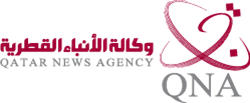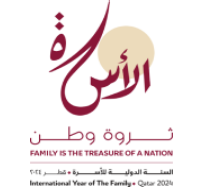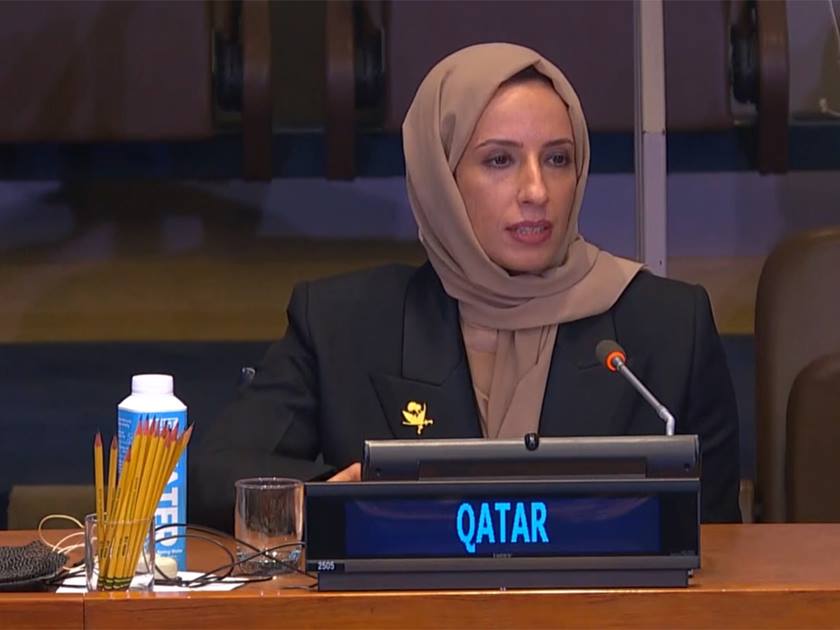New York, September 18 (QNA) - HE Minister of Education and Higher Education Buthaina bint Ali Al Jabr Al Nuaimi underlined that education is a basic right for children both in times of stability and crisis.
HE the Minister of Education and Higher Education took part in the "Education and Learning in Times of Emergencies and Protracted Crises" session within the activities of the "Transforming Education Summit", which was called for by the UN Secretary-General to be convened in New York on Sept. 16, 17 and 19.
Addressing the session, HE Minister Buthaina bint Ali Al Jabr Al Nuaimi noted that education in times of emergencies represents more than a right for education for children, rather it provides a psychological support and a stability factor to help them overcome the trauma they face every day, and a feeling that life has returned to normal, enhances resilience, supports long-term recovery processes and rebuilds a better future.
The Summit's events on Sept. 16 "Mobilization Day" focused on a youth-led and youth-organized mobilization which involved the full participation of a wide range of stakeholders with the aim of conveying the collective recommendations of youth on transforming education to decision and policymakers, informed by the Summit Youth Declaration. It also focused on mobilizing the global public, youth, teachers, civil society, and others to support the transformation of education across the world.
Meanwhile, the Summit's "Solutions Day" on Sept. 17 provided a platform for partners to mobilize support to launch or scale up initiatives connected to the Summit Thematic Action tracks. HE the Minister of Education and Higher Education had a significant and effective participation through interventions in three pivotal sessions - Education and Learning in Times of Emergencies and Protracted Crises; Localizing Education for a Sustainable Future; and Financial Innovations: Expanding the Fiscal Space for Education to Finance Learning Recovery.
Highlighting Qatar's contribution to the humanitarian and sustainable development projects at the "Education and Learning in Times of Emergencies and Protracted Crises", HE the Minister said that the State of Qatar is a major contributor worldwide, by investing in education, health and economic empowerment.
She noted that Qatar Fund for Development (QFFD) has provided nearly $1 billion in grants for educational projects in 64 countries over the past decade, while the Education Above All Foundation has reached more than 10 million children out of school in 56 countries and is constantly expanding its reach and impact.
In response to the educational loss resulted by the COVID-19 pandemic, the Education Above All Foundation established a free and multi-discipline creative bank for educational resources, ensuring the continuity of learning for more than 60o,000 children in 170 countries despite the low resources. Moreover, the Foundation and its partners recently launched the "TRACE" data portal to bridge the global gap for reliable, high-quality, accessible data that collects, visualizes, and provides coordinated analysis of data on attacks on education, HE the Minister of Education and Higher Education added.
In conclusion of her speech, HE the Minister highlighted the importance of all the gathered parties working to ensure that a higher proportion of development aid and government spending is allocated to the teaching and learning system, in line with the education commitment in times of crisis project; indicating that this is not only a moral duty, but is essential for achieving sustainable development and a safer world for all. "Everyone must work together, side by side, to build education systems that are more resilient in the face of environmental and health crises, violent conflicts and other natural and climate crises that we must inevitably prepare to address," Her Excellency added.
In an opening speech at the "Localizing Education for a Sustainable Future" session, HE Minister of Education and Higher Education Buthaina bint Ali Al Jabr Al Nuaimi focused on the importance of localizing education, paying special attention to the issue of bilingualism, values and identity, and localizing the content of school curricula.
HE the Minister expressed her happiness to share the work in this context with Qatar Foundation for Education, Science and Community Development and the Republic of Djibouti, as well as the Regional Office of the United Nations Educational, Scientific and Cultural Organization (UNESCO) in the State of Qatar.
She noted that the demographic structure of the State of Qatar includes, in addition to the Qatari citizens, an important number of various other nationalities working in the country and contributing to its national development, making the State of Qatar a multicultural and multilingual environment supportive of coexistence, mutual understanding and peace.
The State of Qatar realizes the importance of sustainable development as a necessity to achieve prosperity in the future, establish security and achieve peace in the world, Her Excellency stressed, noting that Qatar is a young country and the majority of its population is young, so it is of great importance to raise and educate citizens open to the outside world, but no less important, to be rooted in their national origins and possess a sense of civic responsibility, values such as pride in and understanding of their culture and heritage, and a strong sense of identity that is based on the values and principles necessary to achieve the benefit of their community, being able and proficient in using Arabic - their mother tongue - communicating with their community and interacting with its challenges, including the challenges associated with sustainability, at the local level, thus ensuring their sense of security and belonging in these complex and difficult times.
As part of the "Solution Day" in which multi-stakeholders presented initiatives that will contribute to transforming education, HE the Minister of Education presented an overview of Qatar's "Rasikh" initiative, the new digital learning platform launched by Qatar Foundation in partnership with the Ministry of Education and Higher Education, in cooperation with the Republic of Djibouti and the UNESCO Regional Office in the State of Qatar.
This platform connects all teachers and local institutions in the State of Qatar, from the public and private sectors and other key institutions, in a codified mechanism to establish knowledge that can immediately reach the classrooms. The content was developed by teams of educators in the field of general education (kindergarten to twelfth grade) with local expertise in both Arabic and English. The content includes links with the relevant sustainable development goals, and the context of their impact in the State of Qatar with detailed links to the study curriculum to facilitate its use in schools.
Her Excellency pointed to the challenges faced by students represented in the lack of modern, updated and most useful contents in the Arabic language, and that by using the "Rasikh" learning platform, Arabic-speaking students will no longer face this problem, while at the same time, non-Arabic-speaking students in the State of Qatar in the private school will be able to access to locally designed and English language teaching materials relevant to the national context.
In the session "Financial Innovations: Expanding the Fiscal Space for Education to Finance Learning Recovery", HE the Minister of Education and Higher Education noted the critical importance of the session's focus, which aims to reach solutions related to the fifth course of action, which is education financing, as it is one of the main issues at the Transforming Education Summit.
She noted that as everyone approaches the deadline for achieving the Sustainable Development Goals in 2030, countries must deliver on the promises they made to provide quality education for every child, which inevitably requires greater investment in education. "Since many countries have limited financial capacity that does not allow them to increase spending on education, we must search for innovative ways in order to alleviate financial pressures and increase education funding allocations, by devising and proposing solutions Innovative in an effort to deal with the challenges facing education at the global level, through finding the best ways to invest and spend on education effectively and efficiently, whether as a percentage of total spending or as real value," Her Excellency added.
Her Excellency highlighted the achievements of the Education Above All Foundation through the Educate a Child program, which was able to finance nearly $950 million out of a total amount of $2.3 billion invested with global partners in providing primary education to more than 14 million children deprived of education around the world.
She added that the experience of the Educate a Child program is a living example that we can all imitate to work together, stressing that the possibilities are unlimited in this aspect and will be in the interest of those who have been marginalized educationally.
HE the Minister indicated that the State of Qatar strongly supports the calls for donor countries to allocate higher percentages of official development assistance directly to education and training; and that the State also supports the proposed mechanism to allow countries heavily indebted to restructure and reschedule their debts, thus providing part of the debt interest funds.
She called on participants from the World Bank to contribute to a better understanding of options for increasing education allocations in budgets, and called on the "Global Partnership for Education" to help develop innovative strategies to increase the financial capacity of education.
She also referred to the approach adopted by the State of Qatar towards the issue of financing education at the national and global levels, and that it pays great attention to this issue and has showed its commitment to its students and students of the world by taking a conscious decision to invest in education, stemming from its belief in education as the pillar of social growth.
It is worth noting that the State of Qatar, in the context of its support for the call of the UN Secretary-General to convene the Transforming Education Summit, led in May the regional consultative meeting with the Ministers of Education and with development partners, including representatives of UNESCO and UNICEF, and representatives from West Asia.
Qatar also held a national consultative meeting in preparation for the Transforming Education Summit, organized by Qatar National Commission for Education, Culture and Science and the Education Above All Foundation, in partnership with UNESCO, UNICEF and more than 50 stakeholders at the College of Islamic Studies in Education City.
Qatar's participation in the Transforming Education Summit comes in response to the global crisis in education - which is the crisis of equality, inclusion and relevance - as the summit provides a unique opportunity to raise the level of education to the top of the global political agenda and mobilize action, ambition, solidarity and solutions to restore educational loss associated with the COVID-19 pandemic and sow the seeds for education transformation in a rapidly changing world.
The main summit, which will be held on Sept. 19 (Leaders Day), was preceded by side events on Sept. 16 and 17. (QNA)


